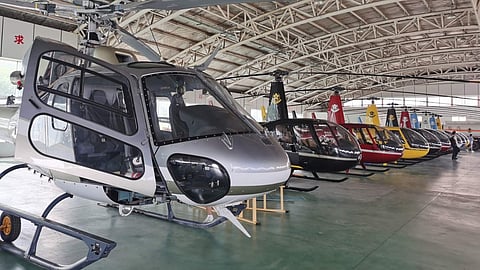
- NEWS
- the EDIT
- COMMENTARY
- BUSINESS
- LIFE
- SHOW
- ACTION
- GLOBAL GOALS
- SNAPS
- DYARYO TIRADA
- MORE

I recently had what a colleague described as the “best time of my life” in China. I’m not entirely sure if that comment was meant as a compliment, but my trip certainly left a lasting impression, even amid a packed schedule.
As one of the media delegates sponsored by the China Public Diplomacy Association, I had the opportunity to explore Beijing, Suzhou, Yancheng, and Shanghai to gain a firsthand, comprehensive understanding of China’s economic, social, and cultural landscape.
Among the rising economic centers is Suzhou, a vibrant and scenic city that remains largely unknown to many.
Suzhou, whose name originates from the Old Yue term “Gusu,” meaning “satisfied places,” was among the first cities officially designated as a “national historical and cultural city” in China.
It spans 8,657.32 square kilometers, has a population of 12.96 million, and recorded a gross domestic product of RMB 2,465.33 billion in 2023.
Emerging tech, innovation hub
The narrative that China merely relies on being a copycat of developed nations is both false and outdated.
Similarly, the belief that Chinese products are inherently low-quality is also incorrect.
These notions fail to acknowledge the substantial advancements China has made in business and technology. China’s robust academic institutions and innovative research have been the driving force behind many of the country’s leading firms and tech startups, demonstrating a commitment to genuine innovation and high-quality production.
A visit to Suzhou Vocational University highlighted China’s technological progress.
During our tour of the Technology Center, we observed the state-of-the-art equipment students use for studying robotics and additive manufacturing (e.g., 3D printing).
Additionally, I learned that many of China’s universities and vocational schools offer majors in drone studies.
Low-altitude economy
This cutting-edge approach reflects China’s broader ambitions, including the development of the “low-altitude economy” — a comprehensive model integrating manned and unmanned activities below 1,000 meters.
This initiative includes the deployment of electric vertical take-off and landing (eVTOL) vehicles for both passenger transport and cargo delivery, supported by extensive commercial services and infrastructure.
I gained insights into this initiative during our courtesy visit to Suzhou Rouhang Transport Development Co. Ltd., a company leveraging on the government’s low-altitude economic strategy.
The company plans to launch its air taxis later this year, starting with an initial fleet of 500 units and targeting an expansion to 10,000 air taxis within a decade.
China is also making significant strides in artificial intelligence (AI). Generative AI speech-to-speech technology is rapidly advancing, opening up new opportunities for communication and accessibility.
AISpeech, a leading provider of speech technology solutions, is capitalizing on this trend with a range of products and services, including the dynamic user interface platform, enterprise business assistants, human-machine dialogue systems, AI chips and intelligent hardware applications (e.g., in-car devices, smart home systems, and robots).
It’s exciting to consider the possibilities as this innovation reaches its full potential. I can imagine myself “driving” a car while sitting comfortably in the back seat using voice commands. This technology also offers significant promise for aiding persons with disabilities and the elderly in overcoming daily challenges.
Doubling down on Phl expansion
It is also worth noting that Panhua Group Co. Ltd.’s expansion plans underscore its increasing commitment to the Philippine market. The company currently operates a P3.5-billion steel plant in Sarangani province and intends to double its investment in steel sheet manufacturing.
However, in a conversation with company chairman Xinghua Li, we gained insights into the challenges faced by Chinese investors in the Philippines. These challenges include high electricity costs (Li said the highest in Asia), limited availability of large tracts of land, and excessive bureaucracy.
When asked what made him invest in the Philippines, Li, a prominent business leader from Suzhou, emphasized the warmth and hospitality of the Filipino people as a key factor in his investment choice.
Besides expanding its steel business, the Panhua Group has unveiled plans to enter the Philippine food industry by establishing a chain of noodle restaurants equipped with automated sales services.
